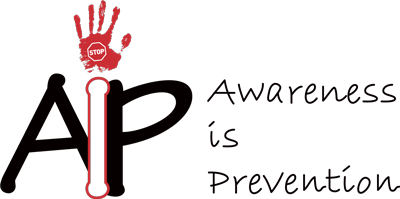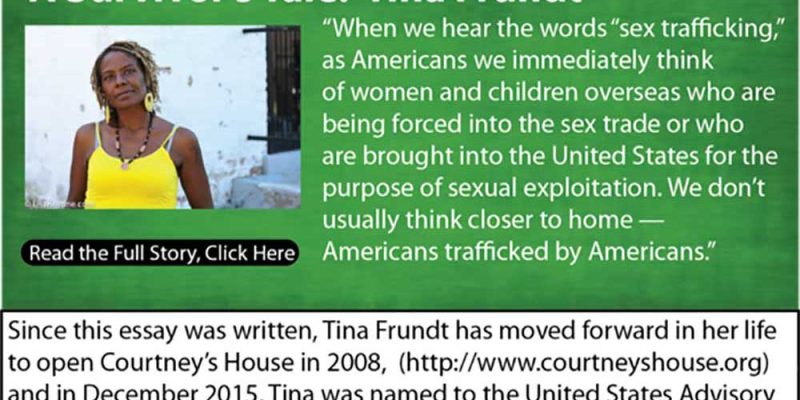Essay
By Tina Frundt
(Since this essay was written, Tina Frundt has moved forward in her life to open Courtney’s House in 2008, (http://www.courtneyshouse.org) and in December 2015, Tina was named to the United States Advisory Council on Human Trafficking by President Obama.
November 28, 2005
The pimps who are trafficking young women and girls on the street in the U.S. have a great marketing tool: the media.
When we hear the words “sex trafficking,” as Americans we immediately think of women and children overseas who are being forced into the sex trade or who are brought into the United States for the purpose of sexual exploitation. We don’t usually think closer to home — Americans trafficked by Americans. But I want you to think about young women and even girls that you have seen late at night when you come home from work or a social event. Maybe you have seen them in the streets in short dresses and spike heels. You turn your heads to look away. We do not look at the faces of these young women and girls who are forced to be out in the street.
Maybe we think this is what they want to do or they wouldn’t be out there. Maybe it is easier to believe that it is an empowering choice they have than face the harsh reality of child sexual abuse, physical and mental abuse, and the pimps that prey on the young women and girls.
To understand all aspects of sex trafficking in the United States, you have to open your mind and let go of what you have seen or heard on television. You need to let go of the media’s portrayal of the “joys” of street prostitution, and open your eyes to the violence and control the pimps and sex traffickers exercise over their victims, who are mostly girls and young women.
ECPAT USA (End Child Prostitution, Child Pornography and Trafficking of Children for Sexual Purposes)’, an Anti-Trafficking agency, states that the average age of entry into street prostitution is between 12 and 14 years old, though there have been cases of girls as young as 9 years old.
I was 14 years old when I was forced into prostitution. Like many teens at that age, finding my own identity and defying my parents were top on my list. So when a man came into my life and showered me with attention and listened to me when I complained about my parents, I did not think twice that he was ten years my senior.
After all, he said I was mature for my age and told me I understood him better than anyone his own age. Little did I know, he was laying down the seeds of manipulation. It did not matter what my parents said, to me they did not understand me and he was the only one that “got me”. After six months, I thought I loved him, at least that is what he told me, so I did what I thought my heart was telling me and ran away to be with him. We ended up in Cleveland, Ohio. He told me we were going to meet the rest of the family.
I had no idea the “family” meant myself and three other girls. After I was introduced to the “family,” I was told what my role would be. I would go out to “work” that night and bring him back the money. How else would we build our dream home? He assured me he would always love me no matter what, but he needed to know how much I loved him by making sure I would do anything for him.
Later that evening, his friends came by the motel. At first, he told me to have sex with someone. I did not want to so his friends raped me. Afterwards, he said, “that wouldn’t have happened if I would have just listened to him at first.” I blamed myself instead of being angry at him for being raped. I was angry at myself for not listening to him in the first place. After that, he picked my clothes out, told me what
to wear, what to say, how to walk, what to say to “Johns” and how much money I was to bring back to him. He then forced me to go out into the streets.
When I first went out into the streets, when I met my first John, I felt like this was something I did not want to do. I walked around the streets back and forth for hours. Finally, I got into a car because we were always being watched and I knew I had to get into a car sooner or later. Our quota was $500 and I had only made $50 that night to give back to the pimp. As a result, he beat me in front of the other girls to make an example out of me and then he made me go back out until I had made the money. This is the same man that took me out to eat, listened to me when I wanted to complain about my parents, gave me words of advice. I was now seeing a side of him that I never saw before — a brutal side where he repeatedly hit me in front of the other girls to teach us all a lesson.
Not only was I shocked, I was scared. What would happen to me if I did try to leave and who would believe me if I told them what was going on? I worked from 6 until 10 p.m. the next night without eating or sleeping. I came back with the $500, but in his mind I still had not learned my lesson. He sent me back outside until 5 a.m. the next morning. After the second day, he finally bought me something to eat, but as a punishment to learn never to defy him again, he locked me in the closet.
Since that night, I was locked in the closet on numerous occasions and had my finger broken which never set right. None of us were ever allowed to see a doctor so we endured our pain by pushing it deep down inside and trying to forget it ever happened.
I can’t count the number of times people have asked me “why didn’t you just leave?” “Couldn’t you escape?” To that, I simply say “do you ask a child that is kidnapped why they didn’t try to leave?” No, we automatically say they are a victim; it wasn’t their fault. Now I know it was not my fault that a pimp manipulated a child.
Under federal law, a child under 18 years who is commercially sexually abused is a victim of trafficking. However under local law a child is charged with child prostitution.
The pimps who are trafficking young women and girls on the street have a great marketing tool: the media. You can turn on the TV now and see pimps glamorized in TV shows, music videos, and movies. Young people use “pimp” in everyday conversation: “my ride is pimped out,” “your clothes are pimping.” They do not understand the reality behind the term.
Pimps prey on young women and girls by finding their weakness and then exploiting it. It is easier to manipulate children, and by the time children become adults, they are broken down and dependent on a pimp. After the pimp gets into your mind, it’s easy for him to maintain control, much like a domestic abuser. From then now on you have to call him “daddy” and he will punish you if he feels like you
have stepped out of line. You are required to bring him $500-$2,000 every night. You are not a woman, you are always a “bitch” or a “ho” and are reminded of that daily.
You are part of his “stable.” If you do not want to follow the rules, then he may sell you at any time to another pimp.
Polaris Project, a non-profit anti-trafficking organization in Washington, DC, reported that a pimp who had three young women and girls in his “stable” were each was bringing back $500 every day. Do the math — the pimp was making about $24,000 a month or $642,000 a year tax free by selling sex with girls and young women he controlled and then keeping all the money.
In the dictionary, the definition of slavery is the “state of one bound in servitude.” If someone tells you to someone else, is that not slavery? If someone forces you to do things against your will and you are not allowed to leave, is that not slavery? Then I ask you why, when pimps traffic young women and girls on the streets of America, isn’t this a form of modern-day slavery?
What happened to me 15 years ago is still going on today. I now work as a Street Outreach Coordinator for the Polaris Project, and I can see that it is not getting any better — it is only getting worse. We see girls and young women every night being forced onto the streets, beaten, and raped to make money for the pimps.
There are organizations all over the world that work with young women and girls helping them escape from trafficking situations, I urge you to learn how you can stop sex trafficking, in the United States and oversees. To stop the problem we have to understand and help make stronger laws to get these traffickers.
I hope that next time you see the young women and girls on the street, you will have more understanding of the reality of their situation. Now that you have the knowledge, what will you do with it?


